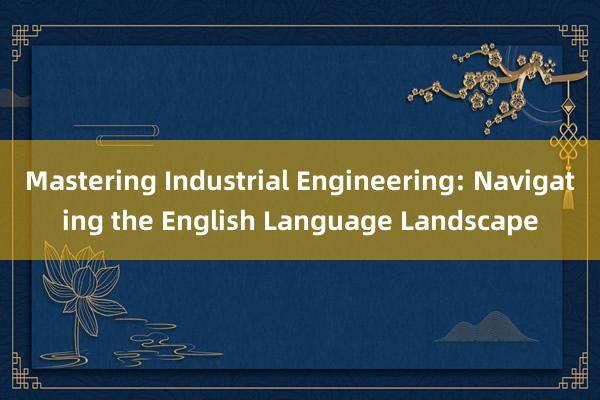时间:2024-10-25 08:59

### Mastering Industrial Engineering: Navigating the English Language Landscape
Industrial engineering is a field that integrates principles of mathematics, economics, and technology to optimize processes and systems in various industries. Achieving mastery in this discipline requires not only a deep understanding of technical concepts but also proficiency in the English language, which is the primary language of scientific discourse and industrial engineering literature. This article explores strategies for navigating the English language landscape when studying and practicing industrial engineering.
#### 1. **Building a Strong Foundation**
- **Vocabulary Expansion:** Begin by expanding your vocabulary related to industrial engineering terms. Use specialized dictionaries and glossaries to understand terms like "capacity planning," "lean manufacturing," and "quality control." Engaging with technical journals and books can significantly enhance your vocabulary.
- **Grammar Mastery:** Understanding English grammar is crucial for clarity and precision in communication. Focus on areas such as sentence structure, verb tenses, and passive voice, which are often used in academic and professional contexts.
#### 2. **Enhancing Reading Skills**
- **Academic Journals and Books:** Regularly read academic journals, conference proceedings, and books on industrial engineering. This exposure helps familiarize you with complex ideas presented in a structured manner and improves comprehension.
- **Technical Writing Practice:** Attempt to write summaries or critiques of articles you read. This practice enhances your ability to understand and articulate complex ideas, a critical skill in industrial engineering.
企业-航洁艺咖啡有限公司#### 3. **Improving Writing Skills**
- **Clarity and Precision:** Aim for clear and precise writing. In industrial engineering, where accuracy can impact safety and efficiency,威利达有限公司 clarity is paramount. Use examples, diagrams, and case studies to illustrate points effectively.
- **Peer Review:** Engage in peer review activities to receive feedback on your writing. This not only improves your work but also enhances your ability to critically evaluate others’ work—a valuable skill in collaborative projects.
#### 4. **Effective Communication**
- **Presentations and Discussions:** Practice giving presentations and participating in discussions. This helps improve your ability to convey complex information succinctly and persuasively. It’s essential in team settings where collaboration is key to solving industrial engineering challenges.
- **Technical Reports:** Write detailed reports on projects or research findings. This practice enhances your ability to organize thoughts logically and present data clearly, skills highly valued in both academic and industrial settings.
#### 5. **Continuous Learning and Adaptation**
- **Stay Updated:** The field of industrial engineering is constantly evolving. Stay updated with the latest research and technologies by attending conferences, workshops, and seminars. This keeps your knowledge base fresh and relevant.
- **Language Improvement:** Continuously work on improving your language skills through courses, language exchange programs, or online resources. Fluency in English will open doors to global opportunities and collaborations.
### Conclusion
Mastering industrial engineering involves not just technical expertise but also the ability to communicate effectively in English. By focusing on vocabulary expansion威利达有限公司, enhancing reading and writing skills, improving communication abilities, and staying continuously updated, professionals can navigate the English language landscape more adeptly. This not only enhances their personal growth but also contributes to the advancement of the field as a whole.